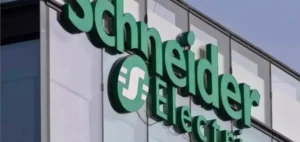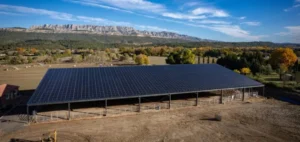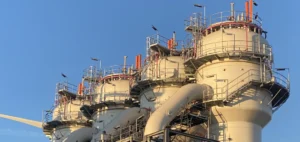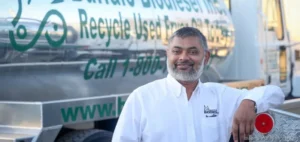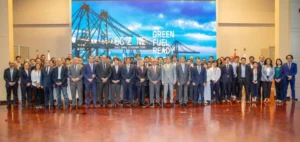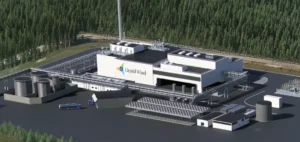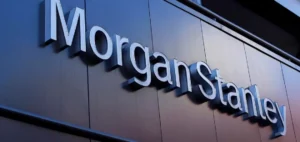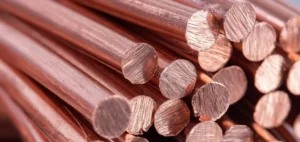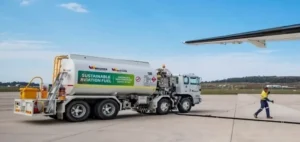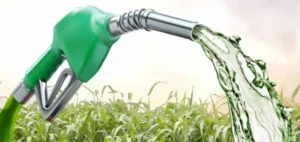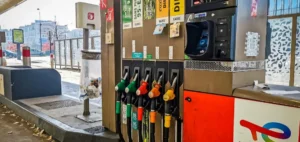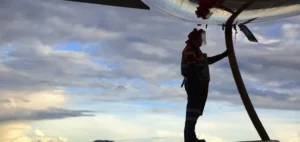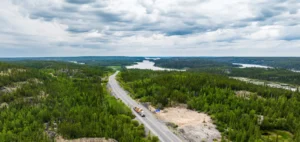Dumat Al Jandal: arrival of the first turbines marks a milestone in the construction of the Middle East’s largest wind farm
The 400 MW Dumat Al Jandal wind farm in Saudi Arabia – developed by a consortium led by EDF Renewables in partnership with Masdar – marks a milestone in its construction with the arrival of 20 wind turbines at the port of Duba.
For its part, Vestas is responsible for the project’s engineering, procurement and construction (EPC) contract, while TSK is in charge of the rest of the plant.
Al Babtain Contracting Company will supply the substations and high-voltage solutions for the project.

Dumat Al Jandal wind farm
Once completed, the Dumat Al Jandal wind farm will be the first wind farm in Saudi Arabia, and the largest in the Middle East.
Construction officially began last August, and commercial exploration is scheduled to start in the first quarter of 2022.
When fully operational, the wind farm will be able to power up to 70,000 Saudi households, while displacing around 988,000 tonnes of carbon dioxide per year.
Dumat Al Jandal will supply electricity under a 20-year Power Purchase Agreement (PPA) to the Saudi Power Procurement Company – a subsidiary of the Saudi Electricity Company (SEC) – a power generation and distribution company.
Frédéric Belloy, Executive Vice President International of EDF Renewables, said:
“This key construction milestone, in the largest wind farm in the Middle East, underlines the progress made in the delivery phase of the project by the consortium and its suppliers, thanks to the support of the Kingdom’s authorities and the entities responsible for implementing the National Renewable Energy Program.” (evwind.es)

The park in figures
A total of 99 Vestas V150-42 MW wind turbines will be installed in the park, with a hub height of 130 metres and a rotor diameter of 150 metres.
The turbines, comprising towers, blades and nacelles, will be assembled directly at the Dumat Al Jandal site, 900 km north of Riyadh in the Al Jouf region.
Dumat Al Jandal, the world’s most profitable wind project
The Saudi Ministry of Energy’s Renewable Energy Projects Development Office awarded the Dumat Al Jandal wind farm (worth $500 million) to the EDF Renewables-Masdar consortium in January 2019, following a tender in which it submitted the lowest bid: $21.3 per megawatt-hour.
This tariff has since been improved to $19.9 per MWh, making Dumat Al Jandal the most profitable wind project in the world.
For Osama bin Abdulwahab Khawandanah, CEO of Saudi Power Procurement Company and responsible for purchasing all production from the Dumat Al Jandal project:
“Dumat Al Jandal is our first wind power project producing electricity on a large scale and, as a key project under King Salman’s renewable energy initiative, it plays a major role in the sustainable diversification of Saudi Arabia’s energy mix. Dumat Al Jandal reflects our strong partnership with the private sector and the commercial viability of wind power, enabling us to establish a competitive renewable energy sector in the kingdom while reducing our carbon emissions in line with Vision 2030.” (Technical Review Middle East)

Mohamed Jameel Al Ramahi, CEO of Masdar, added:
“As well as being the largest wind farm in the region, and the most profitable of its type, Dumat Al Jandal is committed to making a lasting positive impact on the community by purchasing skills and materials in Saudi Arabia, supporting local jobs and businesses, and accelerating knowledge transfer.”(Technical Review Middle East)
The development of renewable energies in the Middle East
In the Middle East, renewable energy projects are flourishing in desert areas, including oversized photovoltaic power plants.
In this dynamic, the United Arab Emirates is certainly the most ambitious, having set itself a target of 75% renewable energies by 2050.
However, the Emirates are not an isolated case in the region.
For example, to make its energy mix greener, Saudi Arabia plans to add 41 GW of photovoltaic power, 9 GW of wind power, 3 GW of biomass and 1 GW of geothermal power by 2032.
At the same time, Qatar is aiming for a 60-fold increase in renewable electricity generation capacity by 2030.
And Oman, Jordan, Bahrain, Iran and Kuwait are developing a large number of photovoltaic projects.
For Muhamed Bou-Zeid, Managing Director of Vestas Middle East and North Africa:
“Saudi Arabia is ready to make the transition and become an example for sustainable development and green energy production that surrounding countries will follow. We are pleased to be part of the kingdom’s project and its successes, and look forward to developing in the country for many years to come” (Arab News)



